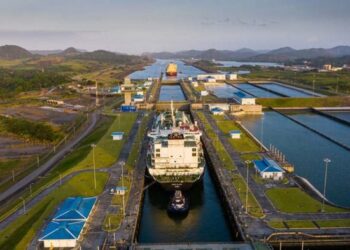PMA to use sanctions compliance and risk management service
 The Panama Maritime Authority (PMA) has become the first port state to use Pole Star’s PurpleTRAC sanctions compliance and risk management service as part of its wider port risk management strategy and as a precaution against the outbreak of Ebola.
The Panama Maritime Authority (PMA) has become the first port state to use Pole Star’s PurpleTRAC sanctions compliance and risk management service as part of its wider port risk management strategy and as a precaution against the outbreak of Ebola.
As part of the PMA’s risk management strategy, all ships intending to enter a Panamanian port are required to post arrival data via their agent into the PMA’s system. In an enhancement to that process, the PMA will use PurpleTRAC to screen port arrivals and Panama Canal transits to ensure compliance against a comprehensive range of economic sanctions and blacklisted ports.
Crucially, PurpleTRAC will also provide Ebola-risk warnings for any ships that have visited countries where the World Health Organisation (WHO) deems the outbreak of Ebola severe – currently the West African countries of Guinea, Liberia, and Sierra Leone.
Where a vessel is found to have called at any of these countries within the last 90 days, an automatic system/operator alert will trigger an enhanced ship inspection by the PMA, the Panama Coast Guard and the Ministry of Health.
Panama receives approximately 9,000 ship port calls per year.
Andrew Peters, Chief Executive Officer of Pole Star comments: “We are delighted to work with the Panama Maritime Authority, the largest flag in the world, to deliver the tools they need to expand and strengthen their risk management strategy. This highlights the flag’s willingness to adopt innovative solutions to create best management practice. It is also further validation of Pole Star’s market leading technology and product delivery capability bringing tangible benefits to the maritime industry.“
| About PurpleTRAC |
|
PurpleTRAC is a comprehensive ship-centric economic sanctions compliance and risk management service used by banks, trade and commodity finance companies, international commodity trading and shipping companies, ship financers, insurers, Flags, and Port-State agencies to underpin their KYC / AML best practice and mitigate against the reputational, financial, and criminal risk of accidental money laundering and terrorist financing non-compliance,. When a ship’s IMO number is entered into the system, the ship with and its ownership structure is screened against a range of international economic sanctions lists and associated SDN’s and PEP’s, it’s last 90-day trading pattern including ports of call is similarly analysed, and multiple Port State Control databases are cross-referenced to provide a verifiable, tamperproof, and evidentiary audit report of the ship’s current and past exposure to risk. |
Source: Pole Star




























































